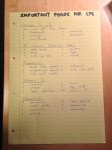- Messages
- 59
Hi there,
I would love to get some feedback on the attached photo of my list of natural food sources that contribute to M.E. recovery. How accurate do you think my list is? Is there anything you would recommend adding?
I'm particularly interested in any natural food sources that can contribute to reducing neuro inflammation which is one of my most debilitating and persistent M.E. symptoms.
Thanks
I would love to get some feedback on the attached photo of my list of natural food sources that contribute to M.E. recovery. How accurate do you think my list is? Is there anything you would recommend adding?
I'm particularly interested in any natural food sources that can contribute to reducing neuro inflammation which is one of my most debilitating and persistent M.E. symptoms.
Thanks

